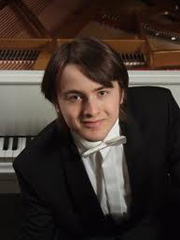People in the News
Of Piano Competitions and Trampolines
 CLEVELAND – Sergei Babayan can hardly contain his wonderment when talking about Daniil Trifonov, who is (hands down) his prize piano student at the Cleveland Institute of Music. “He’s a child still,” says the Armenian-born Babayan. “I don’t think he realizes what kind of lottery ticket he won by winning these competitions. This is like a fairy tale.”
CLEVELAND – Sergei Babayan can hardly contain his wonderment when talking about Daniil Trifonov, who is (hands down) his prize piano student at the Cleveland Institute of Music. “He’s a child still,” says the Armenian-born Babayan. “I don’t think he realizes what kind of lottery ticket he won by winning these competitions. This is like a fairy tale.”
Also a reality. In an astonishing series of accomplishments, Trifonov picked up nearly a dozen prizes at three of the world’s most prestigious competitions in the past nine months. It would have been impressive enough if he’d only won third prize last fall at the Chopin Competition in Warsaw. But soon after turning 20 in March, the Russian pianist went on to take the first prizes (and more) at both the Rubinstein in Israel and – a mere month later – the mother of all competitions, the Tchaikovsky, in Moscow.
The “child” behind these triumphs is a slender, soft-spoken musician who’s more interested in learning new repertoire than dwelling on the galvanic events of the recent past. “Of course, I was very happy when this happened, but now I feel more and more possibilities,” Trifonov says over iced tea at a cafe near the Cleveland Institute. “It’s also great luck. I played successfully, but competitions are never predictable. If you consider a competition as a trampoline to a career, it opens a lot of doors, and then it’s important how you use it and develop.”
As a result of his victories at the Chopin, Rubinstein and Tchaikovsky, the doors have swung wide open for Trifonov. He already has 92 engagements on his calendar for the coming year, including performances of the Tchaikovsky Piano Concerto No. 1 in August in Warsaw under Mikhail Pletnev and in October at Carnegie Hall with Valery Gergiev – head of the Tchaikovsky Competition – and the Mariinsky Orchestra. More concerts are bound to pour forth: Trifonov has just been signed by two major managements, Opus 3 Artists in New York and London-based Intermusica.
Despite these heady opportunities, the native of Nizhny Novgorod, near Moscow, has no intention of rushing headlong into a full-time performance career. Trifonov is determined to spend as much time as possible during the next two years with Babayan, at least until he finishes undergraduate studies at the Cleveland Institute.
Trifonov has added dozens of works to his repertoire in the past year to fulfill competition requirements, but he has yet to learn the Beethoven, Brahms or any of the Rachmaninoff concertos. Babayan refused to let him go near Rachmaninoff’s Third Concerto for the recent competitions, which, in retrospect, was a wise decision. Trifonov won both the Rubinstein and Tchaikovsky playing the Chopin E-minor Concerto. (“Nobody won the Tchaikovsky with Chopin in the whole history!” exclaims Babayan.)
It was Chopin that led Trifonov to Cleveland. A pianist since the age of 5, he studied in Moscow with Tatyana Zelikman for nine years. When Trifonov made a North American solo concert tour in 2009, he realized he wanted to study in the United States.Zelikman consulted with friends, who pointed her to Babayan, also a winner of international competitions. When Babayan took a recording of Trifonov playing Chopin’s Scherzo No. 4 to Joel Smirnoff, president of the Institute, “in 20 seconds he gave him a full scholarship,” says Babayan. “We both saw that immediately.”
Zelikman was careful not to push Trifonov into a career, although he won prizes at many small competitions before the big ones of the past year. “She was afraid it could be harmful for musical understanding at an early age,” he says. Both Zelikman (immersed in the German school of piano playing) and Babayan (the Russian school) concentrated on Mozart and Chopin with their young virtuoso. “Chopin and Mozart develop the soul of the musician not only musically, but personally,” says Trifonov. “It’s not enough to be just a good musician or pianist. It’s also important to have a sensitive personality which can reach in all musical directions.”
On YouTube performances from the Chopin, Rubinstein and Tchaikovsky competitions, Trifonov radiates sensitivity and the joy of music-making. When I ask him about the delight that he exudes at the keyboard, he notes how crucial it is to relax the body while focusing the mind. Most significant is what the composer has set down. “If I listen to recordings of pianists, the first thing I care about is if I hear adoration of the music, not himself,” he says.
Trifonov plans to spend coming months between concert engagements learning more Chopin and Beethoven’s four last sonatas, including the formidable “Hammerklavier,” and the Fourth Concerto. “Of course it’s not for playing,” he smiles, “just for developing.”
At this point, Trifonov he says he is finished with competitions. Babayan is guiding him to concentrate slowly and steadily on nurturing his gifts and expanding his musical purview. “He doesn’t need [lessons] twice a week or spoon-feeding. He’s a dream for a teacher – a real diamond. It’s a one-time life opportunity for someone to have that kind of student.”
As quick as he is to sing the praises of Zelikman and Babayan, Trifonov also looks forward to following his own intuition – what he terms his “fantasy of mind” – and remaining vigilantly self-critical. “You can have a really good concert, but still you can’t be satisfied. It’s important to request more and more from yourself.”
See www.daniiltrifonov.com and video coverage of Trifonov in performance.





 FEATURED JOBS
FEATURED JOBS

 RENT A PHOTO
RENT A PHOTO


